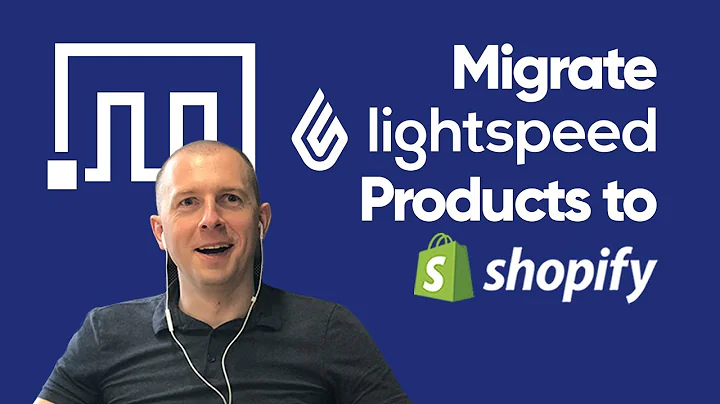Marketplace vs Standalone Store: Which Reigns Supreme?
Table of Contents
- Introduction
- Choosing the Right Platform
- Marketplace vs Standalone Store
- Pros and Cons of Each Option
- Round One: Standalone Store on Shopify
- Benefits of a Standalone Store
- Control over Marketing
- Building a Brand with Social Media
- Repeat Customers and Brand Loyalty
- Round Two: Marketplace on Etsy
- Benefits of a Marketplace
- Trust and Buyer Intentions
- Boost in Algorithm for New Listings
- Building a Community on Etsy
- Round Three: Marketing Strategies
- Social Media Marketing on Shopify
- Utilizing Built-in Buyer Community on Etsy
- Comparing Analytics and Reporting
- Round Four: Growing Your Brand
- Building a Community on Etsy
- Flexibility and Customization on Shopify
- Long-term Asset of a Brand
- Pricing and Products
- Pricing and Fees on Etsy
- Product Selection on Shopify
- Urgency and Scarcity in Marketing
- Conclusion
- FAQ
Battle Royale: Marketplace vs Standalone Store
The choice of platform to sell your products on is one of the most important decisions for any entrepreneur. Whether it's a Marketplace like Etsy or a standalone store on Shopify, this decision sets the foundation for your online business. In this Battle Royale, we will settle the debate once and for all. To help you decide, we have two experts: Jay de Souza, a Marketplace expert from Etsy, and Joe Robert, a Shopify guru. Let's dive into the pros and cons of each option and find out which platform reigns supreme.
Introduction
When starting an online business, choosing the right platform is crucial. The battle between a Marketplace and a standalone store can have a significant impact on your success. In this article, we will explore the benefits and drawbacks of each option and guide you in making an informed decision. We will discuss the marketing strategies, brand building, pricing, and product selection on both Etsy and Shopify. By the end, you'll have a clear understanding of which platform suits your needs best.
Choosing the Right Platform
Marketplace vs Standalone Store
The first decision you need to make as an entrepreneur is whether to sell on a Marketplace or launch a standalone store. Each option has its advantages and disadvantages, and understanding them will help you make an informed choice. In a Marketplace like Etsy, you benefit from an existing customer base and built-in trust. On the other hand, a standalone store on Shopify offers greater control over marketing, brand building, and customization.
Pros and Cons of Each Option
Before diving into the details of each platform, it's essential to consider the pros and cons of selling on a Marketplace versus a standalone store. On Etsy, you have access to millions of potential customers, and the platform takes care of certain aspects like algorithm boosts for new listings. However, standing out among thousands of sellers and relying on customer reviews can be challenging. With Shopify, you have the freedom to create a unique brand, control your marketing efforts, and build a community. However, it requires more effort and investment in marketing and promotion.
Round One: Standalone Store on Shopify
In this round, we delve into the benefits of launching a standalone store on Shopify. Joe Robert, our Shopify guru, presents his case for why a standalone store is a better option than a Marketplace like Etsy. Joe emphasizes the importance of having complete control over marketing efforts and building a brand that resonates with your target audience. He believes that relying solely on search results is not a sustainable strategy and advocates for leveraging social media to reach and engage potential customers.
Building a successful brand requires time, effort, and investment in social media marketing. By adopting a standalone store approach, you have the flexibility to implement various marketing strategies, collaborate with influencers, and drive repeat customers. While there may be upfront costs associated with marketing and promotion, the long-term return on investment can far exceed what a Marketplace can offer.
Round Two: Marketplace on Etsy
Jay de Souza, our Marketplace expert from Etsy, presents the case for choosing a Marketplace like Etsy. He highlights the inherent trust and credibility associated with the platform, as well as the ease of getting your products in front of millions of potential buyers. Jay challenges Joe's argument about the limitations of a Marketplace and emphasizes the value of Etsy's built-in community and boost in algorithm for new listings.
On Etsy, you have the advantage of a platform full of buyers with the intention to purchase. The trust and recognition that comes with the Etsy brand give you a head start in building your customer base. Additionally, Etsy provides a boost in the algorithm for new listings, increasing your chances of getting seen and making sales. Jay argues that with a killer design and effective SEO, you can succeed on Etsy without the need for extensive marketing efforts.
Round Three: Marketing Strategies
Marketing is a crucial aspect of any online business. In this round, we compare the marketing strategies available on Shopify and Etsy. Joe emphasizes the vast audience and potential reach through social media platforms like Facebook, Instagram, and Pinterest. He highlights the importance of analytics and reporting, which Shopify provides to help you understand your target audience and tailor your marketing efforts accordingly.
Jay counters by pointing out that Etsy's community-focused approach and built-in trust make marketing easier on the platform. He challenges the need for extensive marketing efforts, arguing that the traffic and buyer intentions on Etsy eliminate the need for aggressive promotion. Jay suggests that investing time in creating a killer design and optimizing your listings for visibility within the Etsy algorithm can lead to success without heavy marketing expenditures.
Round Four: Growing Your Brand
In this round, we discuss the potential for brand growth on both Etsy and Shopify. Jay emphasizes the sense of community and trust that comes with Etsy, allowing you to establish a loyal customer base. He believes that a Marketplace like Etsy offers stability and repeatability in sales, making it easier to generate recurring business. By leveraging the existing buyer community, you can focus on delivering quality products and building lasting customer relationships.
Joe, on the other hand, argues that a standalone store on Shopify provides more flexibility and customization options. By building a brand on your terms, you have control over every aspect of your business, from product selection to marketing strategies. Joe suggests that engaging with your customers through social media, influencer collaborations, and email marketing can help grow your brand and create a long-term asset.
Pricing and Products
Pricing and product selection play a crucial role in your online business. On Etsy, the pricing structure involves a small fee per listing, making it affordable for sellers to list multiple products. Jay highlights the advantage of this pricing model, allowing sellers to experiment with various designs and gauge market interest without significant upfront costs. On Shopify, there are monthly subscription fees and app charges, but the flexibility in pricing and product selection gives sellers more control over their business.
Both platforms offer opportunities for creating urgency and scarcity in marketing efforts. Etsy's algorithm boost for new listings and built-in buyer community can generate a sense of urgency. Shopify provides the tools and flexibility to implement marketing strategies that create a sense of scarcity and drive sales. By adopting either platform, sellers can tap into these marketing techniques to leverage consumer behavior and drive conversions.
Conclusion
Choosing the right platform to sell your products is a critical decision for any online business. Both Etsy and Shopify offer unique advantages and cater to different business models. Whether you opt for the built-in community and ease of use on Etsy or the flexibility and control of a standalone store on Shopify, success ultimately hinges on your marketing efforts, product selection, and brand building. Assess your goals, resources, and target audience to determine which platform aligns best with your business vision.
FAQ
Q: Is it possible to switch from an Etsy Marketplace to a standalone store on Shopify?
A: Yes, it is possible to transition from one platform to another. However, it requires careful planning and consideration. It's important to assess your business needs, target audience, and marketing strategies to determine if a transition is the right move for your online business.
Q: Which platform is better for a beginner with limited resources?
A: Both Etsy and Shopify offer options for beginners with limited resources. Etsy's low-cost listing fees and built-in buyer community make it an attractive choice for those starting with a smaller budget. Shopify's flexibility and customizable features allow beginners to launch a brand with a unique identity. Consider your specific goals, budget, and desired level of control to determine which platform suits your needs best.
Q: Can I use social media marketing on both Etsy and Shopify?
A: Yes, social media marketing can be utilized on both platforms. Shopify offers integration with various social media platforms, allowing sellers to leverage social media channels for marketing and brand building. Similarly, Etsy sellers can promote their products through social media and drive traffic to their listings. The choice of platform depends on your level of control, brand strategy, and marketing preferences.
Q: Can I sell unique designs on both Etsy and Shopify?
A: Yes, both platforms allow you to sell unique designs. Etsy's focus on handmade, vintage, and unique items makes it an ideal platform for showcasing one-of-a-kind designs. Shopify offers customization options and allows sellers to create a unique brand and sell original designs. Consider your target audience, the nature of your products, and your long-term brand strategy when deciding which platform aligns best with your creative vision.
Q: Do I need to invest in marketing efforts for success on both platforms?
A: While marketing efforts can contribute to success on both platforms, the level of investment may vary. Etsy's built-in buyer community and algorithm boosts for new listings provide a certain level of visibility and sales potential without extensive marketing efforts. Shopify offers more control over marketing strategies, allowing sellers to tailor their efforts to their specific target audience. Assess your marketing budget, resources, and desired growth trajectory to determine how much investment is required for success on either platform.






















